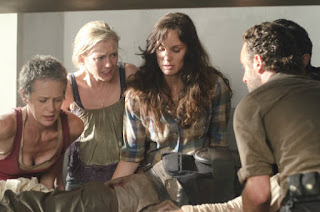An Apocalyptic Way Station
"...two roads diverged in a wood, and I — I took the one less traveled by. And that has made all the difference." — Robert Frost
I have watched "The Walking Dead" with fascination for a couple years now. The world depicted in the show is beyond dystopian, but the themes are powerful and resonate. Sure, there are those that watch each week just to bask in the carnage of a zombified future, but I have always been more interested with the show's take on the slippery slope of humanity in a bleak, desolate, darkly lit future. Last night's episode was one of those that slaps you across the face with a deeper truth than the body count on the screen.
Last night (spoiler alert) a pair of core characters were consumed by the darkness of the world around them. It's hardly a surprise given the pattern of bloodshed and violence on this show. Doubtless it won't be the last time core characters are destroyed this season, either. But it did help to re-frame my thoughts on this show and this world.
During the last season, I remarked on the bleakness of the worldview presented. Any time a character expressed any sense of traditional morality, or softness, they were met with a cruel end. It seemed that the show was intent on reinforcing the idea that, in a post-apocalyptic zombie horror show of a future, there was no room for compassion and decency.
You could look at last night's episode and see that idea reinforced, but I had another thought. Maybe those that show compassion or a moral center die not because they're soft, but because they are free.
I don't believe in Purgatory. It's a (mostly) Catholic creation, the idea of a place were we go to pay our penance until we're ready to be called up to Heaven. But when you think about that idea, and you look at the construct of "The Walking Dead," it's easy to see the parallels.
The world in "The Walking Dead" is without hope and a future. Everyone is either a zombie, zombie food, or will be a zombie. There is simply no escape from that future there. Given that, the characters have two possible paths. The easiest of the paths is to give into the basest of human nature. That's certainly what we see with The Governor, who's so intent of creating kingdom among the ruins of humanity that there is little that he considers taboo.
That's also been the struggle for Rick. Once a leader with conscience, he's been pushed toward the dark side, finally giving in totally, it seems, this season. But what about that other direction? What about the one where you embrace humanity, morality, and conscience? That seems the natural path to your destruction, or is it?
What is the true punishment — seeing an end to your mortal life or being forced to continue living in fear on the razor's edge with a group that's lost its grip on what it means to be human? I have often joked, when watching these kind of dystopian tales, that I hope I don't live to see it. But there is truth in that. Who would want to live that existence? Isn't death — even a gruesome death — somewhat preferable to THAT life? I think perhaps it is.
Given that context, maybe those that cling to a moral center aren't doomed but freed. Consider T-Dog last night. He wanted to show compassion to those who were similarly trapped in the prison. When facing his own death, he espoused genuine faith that God would take care of him. He seemed to yearn to be in the loving embrace of his Maker. He death was violent, but so was his last year of life. In some ways it would be easy to see his death as a merciful doorway to a better eternity.
Even Lori, one of the more polarizing characters on the show, seemed to come to some sort of peace and clarity before her end. She has spent the majority of this season trying to atone and to turn toward a better path. Even at her end, she urged her son to do the same. She may have died, but at least she found peace.
That's more than you can say for Rick and the rest, who will use steely resolve to hunt, kill, and hide in order to survive.
If you think of the world of "The Walking Dead" as purgatory, the message no longer becomes those that value human life and decency are weak. It becomes that those that find their moral center are free.




Comments
Post a Comment